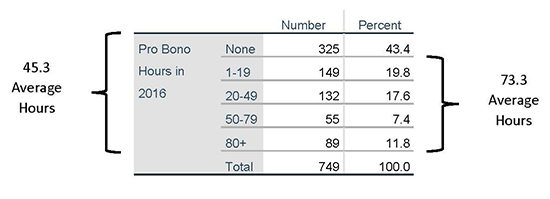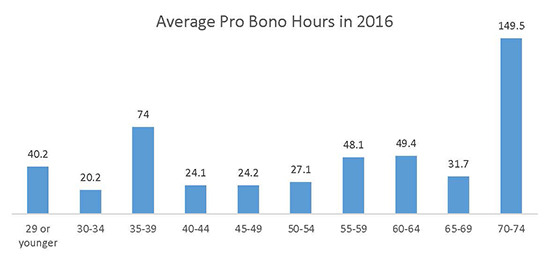
March 7, 2018 – Every year, tens of thousands of Wisconsin residents seek help from a lawyer when they have a legal problem. Some people have the means to pay a lawyer and some do not. For those who cannot pay a lawyer, finding needed legal help can be a major challenge. Most people in this category don’t get help.
Despite the progress we have made in Wisconsin toward providing legal services for low-income residents, the need still outpaces the available resources. Efforts to support and encourage pro bono service were part of that progress.
About the Survey
In early 2017, the State Bar of Wisconsin invited members to participate in an online survey designed to find out who is volunteering, how much, why, where, and in what fashion.
 Jeff Brown, Harvard 1989, is manager of the State Bar Pro Bono Program, liaison to the Legal Assistance Committee, and staff for the Wisconsin Access to Justice Commission. He can be reached by email or by phone at (608) 250-6177.
Jeff Brown, Harvard 1989, is manager of the State Bar Pro Bono Program, liaison to the Legal Assistance Committee, and staff for the Wisconsin Access to Justice Commission. He can be reached by email or by phone at (608) 250-6177.
The survey was developed by the American Bar Association’s Resource Center for Access to Justice Initiatives and its Standing Committee for Pro Bono & Public Service with input from participating states. Survey responses were collected from February to March 2017, and asked about pro bono work in 2016. Ultimately, 47,242 attorneys from 24 states participated, including 819 Wisconsin lawyers.
How Did We Do in Wisconsin?
In general, Wisconsin lawyers did as well or better than their counterparts nationally on measures of pro bono service. Here are some numbers reported by the survey:
-
The percentage of Wisconsin lawyers who reported that they provided some free pro bono legal services in 2016 (62 percent) was slightly higher than for lawyers nationally (57 percent).
-
The percentage of Wisconsin lawyers who reported that they had never provided any pro bono service (18 percent) was close to the national sample (19 percent).
-
For Wisconsin lawyers who reported doing pro bono work in 2016, the average number of pro bono hours reported was 73 (median of 25), while the national average was 65 hours (median of 30).
The number of hours that Wisconsin lawyers reported is generally consistent with the results of the State Bar of Wisconsin 2017 Economics of Law Practice survey, where attorneys in private practice reported that they provided a median of 25 hours of pro bono services for which they were not compensated.
How are Lawyers Volunteering?
Limited-scope representation was the most common type of pro bono legal service reported. Forty-nine percent of Wisconsin lawyers provided only limited-scope representation, compared to 24 percent who provided only full representation.
In general, Wisconsin lawyers did as well or better than their counterparts nationally on measures of pro bono service.
The most common tasks reported were:
-
providing legal advice (80 percent),
-
reviewing or drafting documents (66 percent), and
-
interviewing or meeting with the client (63 percent).
The overwhelming majority of lawyers who did pro bono work in 2016 reported serving individuals (85 percent), while 42 percent said they provided some help to organizations, and 8 percent reported helping a class of individuals.
By Practice Type, Average Hours
There was some interesting variation in the percentage of lawyers who reported that they did some pro bono work in 2016, including by type of practice. For example, 70 percent of Wisconsin lawyers in private practice and 66 percent of lawyers working in nonprofits reported doing some pro bono work in 2016. This compares with much lower rates for lawyers who worked in corporate settings (34 percent) and government attorneys (26 percent).
The average hours of service reported also varied significantly. If you look at all attorneys who responded to the survey – not just those who said that they did some pro bono work in 2016 – the average number of pro bono hours for all Wisconsin lawyers drops dramatically, from 73 hours to 45 hours, and the median drops from 25 hours to six hours.
These number differences point out that we need to choose our words wisely when we talk about how much the legal profession as a whole is giving back through pro bono work.
Average Pro Bono Hours

This chart shows that the Wisconsin lawyers responding to the survey reported an annual average of 45.3 hours of pro bono work. Excluding lawyers who reported zero pro bono hours, lawyers did 73.3 average pro bono work hours.
When Age and Place Matter
There is also significant variation in in the hours reported by age.
Wisconsin lawyers ages 35-39 and 70-74 reported significantly higher average pro bono hours. Lawyers aged 70 and over reported nearly 150 hours each, with lawyers ages 35-39 reporting 74 hours – the next highest average pro bono hours. Lawyers age 30-34 reported the lowest hours, at just over 20.

Lawyers ages 35-39 and ages 70-74 – presumably newly retired – reported higher average hours of pro bono work.
Geography also played an important role in how much attorneys reported volunteering. Wisconsin attorneys who practice in rural areas reported significantly more pro bono work on average (106 hours) than their counterparts in towns (61 hours), cities (41 hours), and suburbs (37 hours).
The Importance of Law Schools and Judges
Our law schools play a very important role in building pro bono service by the next generation Wisconsin lawyers.
Among the 62 percent of Wisconsin respondents who indicated that they had provided pro bono legal services as a law student, more than half (57 percent) noted that doing so made them “more likely” or “far more likely” to provide pro bono services after graduating from law school. That’s a ringing endorsement for the pro bono programs at Marquette University Law School and the University of Wisconsin Law School.
Wisconsin attorneys who in rural areas reported significantly more pro bono work on average.
Encouragement from judges topped the list of things that Wisconsin lawyers said prompt them to volunteer. It ranked far higher than pro bono recognition. Wisconsin’s federal courts offer a good example of a system where judges and court staff take a more active role in recruiting and recognizing volunteers (such as the U.S. District Court Eastern District of Wisconsin’s pro bono program) while also supporting efforts by the federal court bar (such as the Eastern District of Wisconsin Bar Association’s Pro Se Federal Civil Litigant Help Line).
Serving a Long Tradition
Wisconsin lawyers have a long tradition of giving back through pro bono service. The amount of service varies greatly from those who donate a few hours per year to those qualifying for the Pro Bono Honor Society (at least 50 hours of pro bono service for low-income people).
I hope that this snapshot of what lawyers are doing will encourage you to volunteer – you can find out about pro bono opportunities on WisBar.org or contact me.
After all, from our law school experiences, to the lawyer’s oath and into retirement, pro bono is in the DNA of the legal profession.
Read the results of the survey: Supporting Justice in Wisconsin: A Report on the Pro Bono Work of Wisconsin’s Lawyers.
Wisconsin’s Pro Bono Stars
Find out more about Wisconsin lawyers doing pro bono work in these recent articles from InsideTrack:
